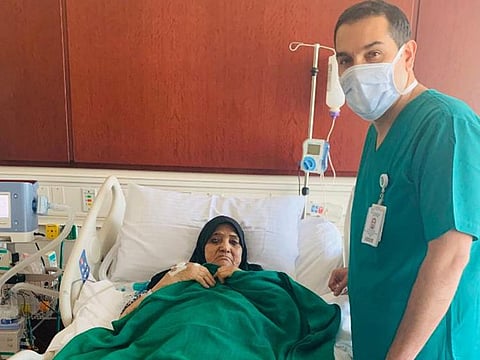98-year-old Emirati becomes oldest patient in UAE to undergo feeding tube operation
Operation enabled grandmother to come off a ventilator and survive

Dubai: A 98-year-old Emirati patient has become the oldest person in UAE to have a percutaneous gastric tube placed inside her stomach that has helped wean her off a ventilator and live.
Balkis Mohammad was admitted to American Hospital, Dubai, three weeks ago, as she was unable get proper nutrition or hydration orally owing to her age.
Dr Aws Sarmad Al Fahad, consultant interventional radiologist at the American Hospital decided to conduct the procedure when the patient did not take well to the naso-gastric tube.
“When the patient came to us, three weeks ago, there had been an unsuccessful attempt to put in a naso-gastric tube in her previous hospital that had caused lung aspiration and she was put on the ventilator.
“After she stabilised, we were able to successfully place a naso-gastric tube under radiological guidance but she was not very comfortable with it. Finally, it was decided that we would carry out the percutaneous Gastrostomy.”
What is Percutaneous Gastrotomy?
Normally this procedure is carried out in patients not older than 85 years of age, but Dr Al Fahad decided to go ahead as it seemed the safest procedure in this case.
“Percutaneous Gastrostomy is a procedure where a feeding tube, under radiological guidance is inserted in the stomach of a patient through the abdominal wall. This is done under local anaesthesia and is a minimally invasive procedure as compared to endoscopic placement of the tube which is done with more sedation and there are chances of perforation of bowels. This is properly guided and safe. In case of geriatric patient this provides them independence as compared to the naso gastric which can irritate the nasal lining.
“This procedure is done in case of patients who suffer difficulty in eating or swallowing or have recurrent lung aspiration. The tube bypassing the mouth and the oesophagus and provides proper nutrition, medicines and hydration directly into the stomach via the tube. The patient was very old and she had all the problems in eating and swallowing. Her health was failing and she was put on ventilator. However, after the procedure, she is doing well.”
Dr Al Fahad added that the PG causes minimal discharge until a proper track is formed and he recommended it to be changed 2-3 times a year. “Acid in the stomach erodes the plastic, so it needs to be changed to maintain the quality.
Mohammad’s daughter told Gulf News: “My mother suffered from shortness of breath and had difficulty in breathing, when we rushed to the hospital she was in a very precarious condition. We were afraid that her frail body would not be able to withstand any complicated procedure. But Dr Al Fahad assured us and with this procedure and we are thankful and relieve that she has recovered, is stable and might be discharged soon.”
Sign up for the Daily Briefing
Get the latest news and updates straight to your inbox









